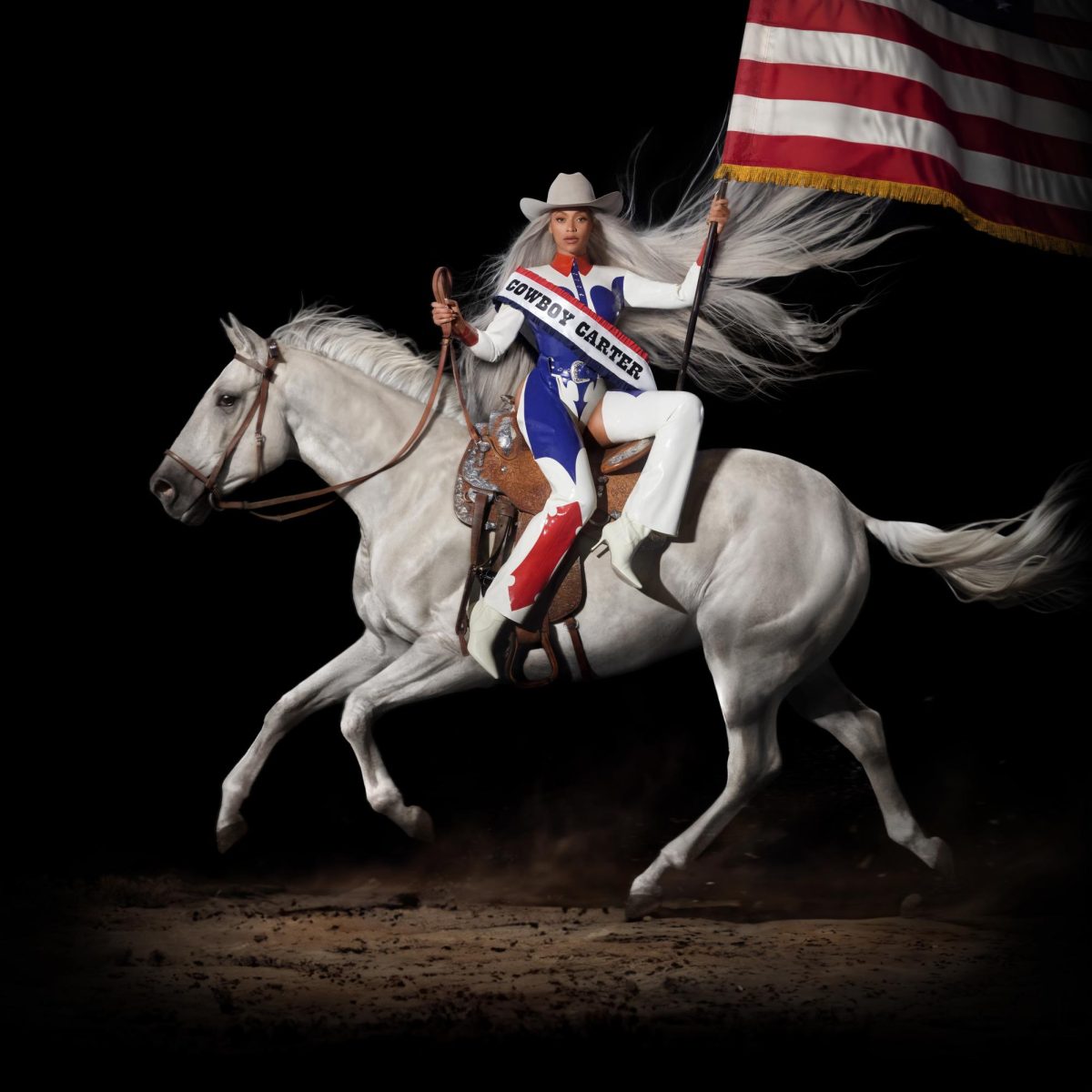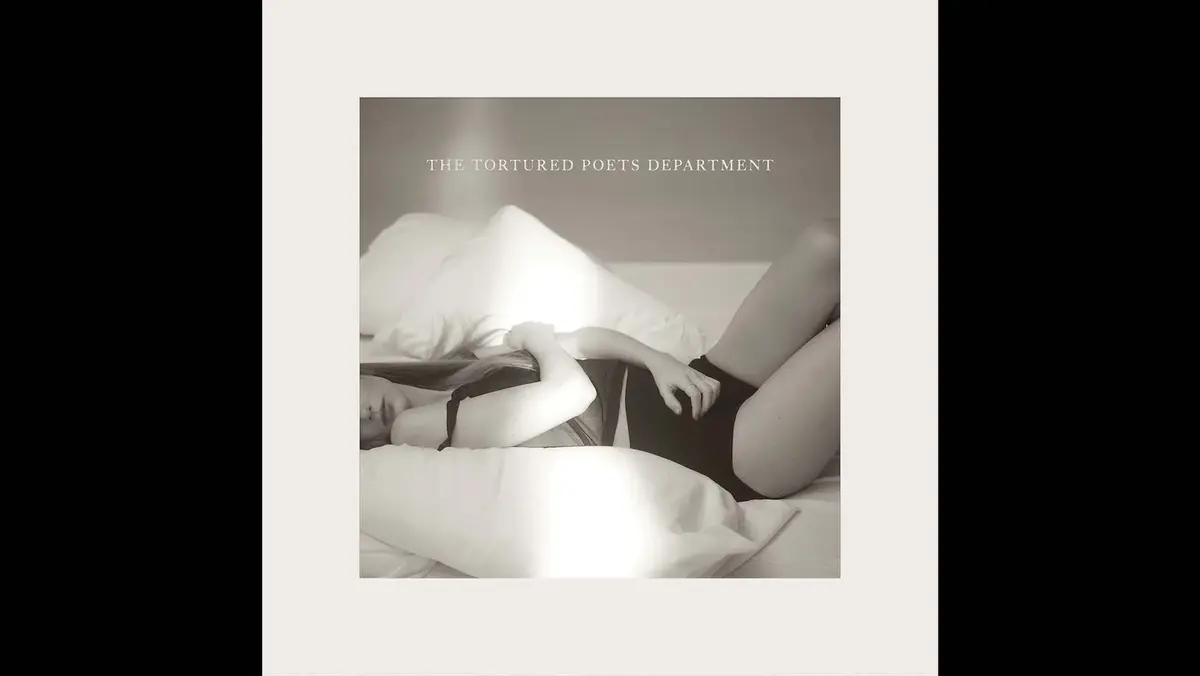Opening with the line, “Nothin’ really ends/For things to stay the same, they have to change again,” Beyoncé’s highly anticipated album, “Cowboy Carter,” embarks on a profound exploration. At its core, the album delves into introspection, questioning the defining lines of the country genre and America itself. These two institutions have historically suppressed African American voices—a troubling trend that persists today. In the realm of modern country music, dominated and defined by heterosexual white conservative men, the genre often amplifies narratives centered on beer, girls and a romanticized version of rural life.
Given this backdrop, it is unsurprising that such ingrained prejudices have significantly impacted Black voices, including Beyoncé’s. While “Cowboy Carter” marks her first complete venture into the country genre, her flirtation with country was evident in the past, notably with her song “Daddy Lessons” from the album “Lemonade.” Her performance of the song with The Chicks (formerly known as the Dixie Chicks) at the 2016 Country Music Awards was met with vehement backlash and racist vitriol from both fans and the audience. She was branded as “not country enough” and faced accusations of not belonging in the genre, despite her deep Southern roots. The outcry was so severe that the Country Music Association went as far as deleting all promotional material regarding the performance in a bid to stave off further backlash.
This pivotal event catalyzes “Cowboy Carter,” as Beyoncé herself revealed in an Instagram post promoting the album. She references an experience where she felt unwelcome, using it as a springboard to delve into the forgotten, intertwined history of African Americans and the Americana genre.
One of the album’s most notable nods to the complicated history of country music is the inclusion and homage to Linda Martnell. Martnell made history as the first Black woman to grace the stage of the Grand Ole Opry, the famed country radio station, in 1970. Despite her early success, Martnell was swiftly sidelined by white executives following the release of her debut album, “Color Me Country,” in favor of promoting more “palatable” stars.
While not explicitly referenced, this loaded history lends weight to Martnell’s voice, particularly in her introductory voiceover at the start of “Spaghetti,” “Genres are a funny little concept, aren’t they?” Martnell muses. “In theory, they have a simple definition that’s easy to understand. But in practice, well, some may feel confined.”
Martnell’s commentary segues into a genre-defying track featuring Shaboozey, an African-American rapper, and Beyoncé rapping over a Brazilian funk sample. Beyoncé delivers the song with enthusiasm and vocal intensity, yet despite the promise, the song ultimately falls short of its potential, gradually losing momentum and ending somewhat abruptly. Despite some clumsy lyrics, such as “At the snap of my fingers, I’m Thanos, damn it,” the energy and ambition in “Spaghetti” are palpable, leaving a lingering sense of missed opportunity.
Martell also features in the aptly titled “The Linda Martell Show,” an interlude introducing the next track, “Ya Ya” — one of the album’s standout pieces. “Ya Ya” is a psychedelic soul-influenced stomp that cleverly incorporates samples from Nancy Sinatra’s “These Boots Are Made for Walking” and interpolates the Beach Boys’ “Good Vibrations,” with Beyoncé channeling the spirit of Tina Turner. It is a triumphant blend, heightened by subtle references to the chitlin circuit—a network of performance venues originally located in the Jim Crow South, catering to African American musicians, comedians, and entertainers during the era of racial segregation.
In “Ya Ya,” Beyoncé further explores these themes of social commentary with lyrics like “Whole lotta red in that white and blue, huh/History can’t be erased, ooh,” referencing the symbolism of the American flag: white for innocence, red for valor and blue for perseverance and justice. These lines showcase a profound truth—while American ideals of liberty, freedom, and justice are enshrined in the nation’s ethos, they have been hard-won by people of color over centuries of struggle. From the Civil War to the ongoing Civil Rights Movement that took root in the 1940s, these ideals have been fought for, not simply granted to marginalized communities.
“Ya Ya” is not the sole instance where Beyoncé delves into the complexities of American identity in “Cowboy Carter”. The album’s, “American Requiem”opening tracking sets a powerful tone—a tempest of gospel and rock infused with sitar, guitar riffs, growls, and screams. As the title suggests, it feels like a funeral procession, emphasized by haunting choir vocals in the background. Beyoncé’s lyrics, such as “Them big ideas are buried here” and “Pretty house that we never settled in,” are enigmatic yet poignant, shedding light on the nation’s failure to ensure equality for all and the resultant perpetuation of isolation.
“American Requiem” is marked by the recurring motif of the double “ii” denoting Act II throughout the album. The song seamlessly transitions into “Blackbird”—a faithful cover of The Beatles’ song written in 1968 about the experiences of the “Little Rock 9.” These nine African American teenagers, who enrolled in the all-white Little Rock Central High School in 1957, were central to the Little Rock Crisis, prompting President Eisenhower’s intervention to ensure their safety and uphold the principles of Brown v. Board of Education. Beyoncé infuses “Blackbird” with new life, drawing from her experiences as an African American woman. Accompanied by emerging Black country singers Brittney Spencer, Reyna Roberts, Tanner Adell, and Tiera Kennedy, the song becomes a testament to the ever-evolving face of change in American society.
However, this rumination into the nation and its ideals appears to reach its zenith relatively early in the album. While some sentiments resurface in tracks like “Alligator Tears”—a sultry, metaphor-laden piece steeped in biblical imagery, where Beyoncé uses a toxic love relationship to dissect the intricate dynamics of race and religion in America—these insights eventually become repetitive and hollow.
Particularly, when Beyoncé broaches topics of wealth and inequality, the commentary begins to feel empty, especially given her reported net worth of $800 million, according to Forbes. It has been decades since she likely had to ponder over financial decisions, rendering such comments superficial. The absence of nuanced observations about the United States feels like a missed chance, especially considering the deep connection between the genre of country music and the nation itself. This feeling is further compounded by Beyoncé’s striking pose with the American flag on the album’s cover art, hinting at a broader thematic exploration of the nation. Nevertheless, the album falls short of fully embracing and dissecting this theme, leaving listeners yearning for a deeper examination of the complexities of American identity and society.
However, Beyoncé seamlessly weaves the rich history of the country genre into her album, a feat exemplified by her collaborations with Willie Nelson, a towering legend in the Nashville music scene. This integration is particularly striking in the sixth track, “Smoke Hour,” featuring Willie Nelson. Beyoncé’s sudden absence from the track is a surprising yet welcomed turn, as snippets of Sister Rosetta Tharpe’s “Down by the River Side,” Chuck Berry’s “Maybellene,” and Roy Hamilton’s 1957 hit “Don’t Let Go” bleed into Nelson’s smoky voice. Nelson’s mention of the listener tuning into “The Smoke Hour” on KNTRY Radio Texas, a fictional radio station recurring in another track titled “Smoke Hour II,” frames the entire album as a collection of songs introduced by iconic radio DJs like Dolly Parton and Linda Martell.
The inclusion of 1950s cuts to introduce the country station is an inspired choice. Beyoncé deliberately references the decade when format-based radio emerged, solidifying racial lines within country music. It is a poignant reminder of the genre’s fraught history, wherein Beyoncé herself has been a victim of country stations refusing to play artists or songs deemed non-“traditional” or, in other words, non-white. A SongData study published in 2021 revealed that white artists perform approximately 98% of the music on country radio. Even after the release of her lead single, “Texas Hold ‘Em,” a contemporary country track infused with banjo plucks and line-dancing beats, local Southern and country radio stations dismissed it as “pop.” It wasn’t until Beyoncé’s fans bombarded these stations with requests and online call-outs that country DJs relented and began to play her music.
Beyond the standout “Texas Hold ‘Em,” Beyoncé herself acknowledges that “Cowboy Carter” isn’t strictly a country album; it’s, in her own words, a “Beyoncé” album. This sentiment becomes evident through the diverse genres across the 27-track record. For instance, in “Daughter,” a haunting murder ballad delving into a family’s legacy of violence, Beyoncé showcases her remarkable vocal range with a rendition of the famous Italian aria “Caro Mio Ben” in the middle of the song. “II Most Wanted” sees Beyoncé and Miley Cyrus harmonizing beautifully over an interpolation of Fleetwood Mac’s “Landslide.” The song weaves a narrative of smoking cigarettes and “flying down the 405,” reminiscent of classic Western movies like “Thelma and Louise” and “Bonnie and Clyde.”
However, not all collaborations hit the mark. “Levii’s Jeans,” featuring Post Malone, falls short of expectations. It feels derivative and lacks the depth in other tracks, making it a lowlight on the album.
These aforementioned collaborations with Miley Cyrus and Post Malon have garnered Beyonce critiques. As for all of her advocacy and activism for black female empowerment, in the album, black women are relegated to background voices while white artists like Miley Cyrus and Post Malone take center stage as collaborators and duet partners. This choice is especially notable given Post Malone’s previous controversies as a “culture vulture.”
Ultimately, “Cowboy Carter”, with its multitude of tracks, is an uneven offering. While songs like “American Requiem” and “Ya Ya” soar, others like “Jolene,” which Beyoncé questionably transforms into a more ominous warning rather than the original’s vulnerable plea, and “Levii’s Jeans” disappoint. However, the album’s celebration of African-American voices in the country genre and its adventurous genre-blending approach make it worth a listen. My personal rating stands at 4 out of 5 stars.














